#Fung Bo-Bo
Explore tagged Tumblr posts
Text
Ba Ban Bang Be Ben Beng Bi Bia Bian Biang Bie Bien Bieng Bing Bio Bion Biong Biu Biun Biung Bo Bon Bong Bu Bun Bung Cia Cian Ciang Cie Cieng Cii Ciia Ciian Ciiang Ciie Ciien Ciieng Ciin Ciing Ciio Ciion Ciiong Ciiu Ciiun Ciiung Cio Cion Ciong Ciu Ciun Da Dan Dang De Deng Di Dia Dian Die Dien Dieng Din Ding Dio Dion Diong Diu Diun Diung Do Don Dong Du Dung Fa Fan Fang Fe Fen Fi Fia Fian Fiang Fie Fien Fieng Fin Fing Fio Fion Fiong Fiu Fiun Fiung Fo Fon Fong Fu Fung Ga Gan Gang Ge Gen Gi Gia Gian Giang Gie Gien Gin Ging Gio Gion Giong Giu Giun Giung Go Gong Gu Gun Ha Han Hang He Hen Heng Hi Hia Hian Hiang Hie Hien Hieng Hin Hing Hio Hion Hiong Hiu Hiun Ho Hon Hu Hun Jia Jiang Jie Jien Jii Jiia Jiiang Jiie Jiien Jiieng Jiin Jiing Jiio Jiion Jiiong Jiiu Jiiun Jio Jion Jiu Jiung Ka Kan Kang Ken Keng Ki Kia Kian Kiang Kie Kien Kieng Kin Kio Kiong Kiu Kiun Kiung Ko Kon Kong Ku Kun Kung La Lan Le Len Li Lia Lian Liang Lie Lien Lieng Lin Ling Lio Lion Liong Liu Liun Lo Lon Long Lu Lun Lung Ma Me Men Meng Mi Mia Miang Mie Mieng Min Ming Mio Mion Miong Miu Miung Mo Mon Mong Mu Mun Mung Na Nan Nang Ne Neng Ni Nia Niang Nieng Nin Ning Nio Nion Niu Niung No Non Nong Nu Nung Pa Pan Pang Pe Pen Peng Pi Pia Pian Piang Pie Pien Pieng Pin Ping Pio Pion Piong Piu Piun Piung Pon Pu Pun Pung Qa Qang Qe Qen Qeng Qi Qia Qian Qiang Qie Qien Qieng Qin Qing Qio Qion Qiong Qiu Qiun Qiung Qo Qon Qong Qu Qun Qung Ra Ran Rang Re Ren Reng Ri Ria Rian Riang Rie Rien Rieng Rin Ring Rio Rion Riu Riun Ro Ron Rong Ru Run Rung Sa San Sang Se Si Sia Sian Siang Sie Sien Sieng Sin Sing Sio Sion Siong Siu Siun Siung So Son Song Su Sun Sung Ta Te Ten Teng Ti Tia Tian Tiang Tie Tien Tieng Tin Ting Tio Tion Tiong Tiu Tiun To Ton Tong Tu Tun Tung Wa Wang Wen Wi Wia Wian Wiang Wie Wieng Win Wing Wio Wion Wiong Wiu Wiun Wo Won Wong Wu Wun Wung Xia Xian Xiang Xie Xien Xieng Xii Xiia Xiian Xiiang Xiie Xiieng Xiin Xiing Xiio Xiiong Xiiu Xiiun Xio Xion Xiong Xiu Xiung Za Zan Zang Ze Zeng Zi Zia Zian Ziang Zie Zieng Zin Zing Zio Zion Ziong Ziu Ziun Ziung Zo Zon Zu Zung
3 notes
·
View notes
Text
The Seletar Mall Restaurants
The Seletar Mall, located in the heart of Sengkang West, is a convenient family-friendly shopping destination offering a variety of dining options to suit different preferences. Whether you are looking for a quick snack, a full meal, or a place to enjoy coffee with friends, the mall provides numerous food choices. With several well-known restaurant chains, local favourites, and new brands, it is a reliable choice for residents and visitors.
The Seletar Mall
What to Eat at The Seletar Mall
Best Dining Options at The Seletar Mall
The Seletar Mall Food & Restaurant Directory
BAE.GAL BY SWEE HENG
BENGAWAN SOLO
BOOST JUICE BARS
CELLARBRATION
CHATERAISE
COLLIN’S®
COTTI COFFEE
CROLO BY SWEE HENG
DIN TAI FUNG
DODO
EAT 3 BOWLS
FISH MART SAKURAYA
FOUR LEAVES
FRAGRANCE BAK KWA
GONG YUAN MA LA TANG
HA-JUN KOREAN
HAI DI LAO HOT POT
HAN'S CAFÉ
JUEWEI 绝味
JUICE FARM
KOI EXPRESS
LAO HUO TANG
LET'S EAT
LIHO@CAFE
MCDONALD'S
MIX.STORE
MOS BURGER
MR COCONUT
MY KAMPUNG
NAN YANG DAO
NINE FRESH
PLAYGROUND BY PLAYMADE
POLAR PUFFS & CAKES
PONTIAN WANTON NOODLE
POPEYES FAMOUS LOUISIANA CHICKEN
POTATO CORNER
RAMEN HITOYOSHI
SAIZERIYA
SAKON THAI VILLAGE
SAN.WICH BY SWEE HENG
SCARLETT
SHIHLIN TAIWAN STREET SNACKS
SINGAPURA HERITAGE
SOI 47
SONG FA BAK KUT TEH
STARBUCKS COFFEE
STUFF'D
SUBWAY
SUKIYA
SUSHI EXPRESS
SWEE HENG 1989 CLASSIC
TAMJAI SAMGOR MIXIAN
TEN POINTS PORRIDGE
TEXAS CHICKEN
TIONG BAHRU JIAN BO SHUI KWEH
TOAST BOX
UMISUSHI
WOOWFLES
XIANG XIANG HUNAN CUISINE
YA KUN KAYA TOAST
YAKINIKU-GO
YEW KEE SPECIALTIES
Facilities and Accessibility
What are The Seletar Mall Opening Hours?
The Seletar Mall Address & Telephone
The Seletar Mall Food & Restaurant Directory
0 notes
Text
八星報喜
H:八星報喜(1988年),多年前的電影,在龍祥時代重播。脚跨兩條船,偷情,香港流行性喜劇。多年後回頭看,多少演員已息影多年。三段姻緣不同結局。20250207W5
八星報喜
《八星報喜》(英語:Eighth Happiness)是1988年上映的香港喜劇電影,由杜琪峯執導,周潤發、張學友、鍾楚紅、鄭裕玲主演。香港票房三千七百萬港元,為該年香港電影票房冠軍[2]。
快速預覽 八星報喜Eighth Happiness, 基本資料 ...
劇情
一次電話線故障,促成方氏三兄弟的三段姻緣。大哥方劍輝(黃百鳴 飾)品性敦厚,與失婚婦人吳芬芳(馮寶寶 飾)由冤家發展成戀人;生性風流的二哥方劍郎(周潤發 飾)瞞著女友飄紅(鄭裕玲 飾),與熱情如火的美麗(鍾楚紅 飾)迅即擦出火花;三弟方劍笙(張學友 飾)性格害羞,與在公園邂逅的開朗少女瑩瑩(袁潔瑩 飾)萌芽出一段細水長流的純潔愛情。 三段姻緣來得意外,結局卻各有不同……
演員
演員角色粵語配音備註周潤發方劍郎周潤發方氏三兄弟的���哥黃百鳴方劍輝黃百鳴方氏三兄弟的大哥張學友方劍笙黃志成方氏三兄弟的三弟鄭裕玲鄭飄紅鄭裕玲方劍郎女友鍾楚紅Beautiful鍾楚紅和方劍郎偷情馮寶寶吳芬芳袁潔瑩袁瑩瑩和方劍笙萌芽出一段細水長流的純潔愛情李香琴袁瑩瑩母李香琴周文健史泰龍陳欣追求袁瑩瑩曹查理副機師長盧雄追求鄭飄紅鄭丹瑞Beautiful男友鄭丹瑞黃坤玄明仔(吳芬芳兒)泰迪羅賓吳芬芳夫
電影歌曲
主題曲
歌名演唱者作曲填詞〈人人望放假〉張學友Johann Strauss黃百鳴
獎項
更多資訊 年份, 頒獎典禮 ...
相關條目
2012年電影《八星抱喜》
參考資料
馮寶寶(英語:Petrina Fung Bo-Bo,1953年10月30日[註 1]—),香港女演員,被尊稱為Bobo姐,出生於英屬北婆羅洲山打根(即今馬來西亞沙巴的山打根)[4],籍貫廣東中山,從兩歲半出道至今,拍攝超過200部電影,其中從6歲至9歲最紅的童年時期,馮寶寶拍攝超過120部電影,是兩岸三地、世界華人電影史上,迄今拍電影數量最多的童星,遂有「東方莎莉·譚寶」的美譽,在全球華人社會有廣泛的知名度。
鄭裕玲(英語:Carol Cheng Yu Ling,1957年9月9日—),暱稱DoDo(嘟嘟),人稱Do姐或DoDo姐,為香港女演員、節目主持及配音員,曾為無綫電視部頭合約藝人(專門主持節目),亦為「至八會」成員之一,同時也是會中的「班長」[4],香港電影金像獎及台灣電影金馬獎雙料影后、香港視后,她亦為首位奪得影后視后大滿貫的女藝人。
鍾楚紅(英語:Cherie Chung Chor Hung,1960年2月16日—),暱稱「紅姑」,出生於香港,香港女演員。於1984年及1987年兩度榮獲亞太影展最佳女主角殊榮。
袁潔瑩(英文名:Fennie Yuen Kit Ying,1969年9月15日—),香港女演員及歌手,開心少女組成員。
李香琴(英語:Lee Hong-kum,1932年1月13日—2021年1月4日[6]),原名李瑞琴[7],人稱「琴姐」,祖籍廣東順德勒流鎮番村[8],香港女演員,前無綫電視及亞洲電視女���員,投身電影及電視劇界前於粵劇出身[9]。


0 notes
Photo

I can't think of a clever English name for this but how about 龜梨友 (🇭🇰🇲🇴 gwai¹ lei⁴ jau²) in Cantonese, to sound like “(here) comes Turtle Friend”?
A play on 龜 (🇭🇰🇲🇴 gwai¹) for ‘turtle/tortoise’ 🐢, 友 (🇭🇰🇲🇴 jau²) for ‘friend’ 💕, 嚟 (🇭🇰🇲🇴 lei⁴) for ‘come’, 鳳梨 (🇭🇰🇲🇴 fung⁶ lei⁴), an alternative word for ‘pineapple’ 🍍, and 菠蘿油 (🇭🇰🇲🇴 bo¹ lo⁴ jau⁴), the name for ‘pineapple bun with butter’.
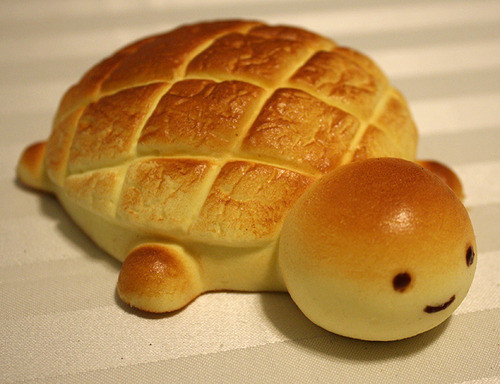
#Though I think this picture is the Japanese equivalent,メロンパン (melon pan)#Rather than a 菠蘿包/油? Regardless! The buns are similar enough!#Food#Melon Pan#Pineapple Bun#Cantonese#Chinese Language#Language
3K notes
·
View notes
Text
Call Girl ’88 (1988)








應召女郎 Call Girl ’88 (1988) directed by David Lam cinematography by Jingle Ma Choh-Sing
#應召女郎#Call Girl ’88#david lam#hk cinema#asian cinema#aesthetics#80s#maggie cheung#stills#fung bo-bo#hong kong movies
7 notes
·
View notes
Text
江湖奇俠 Temple of the Red Lotus (1965)
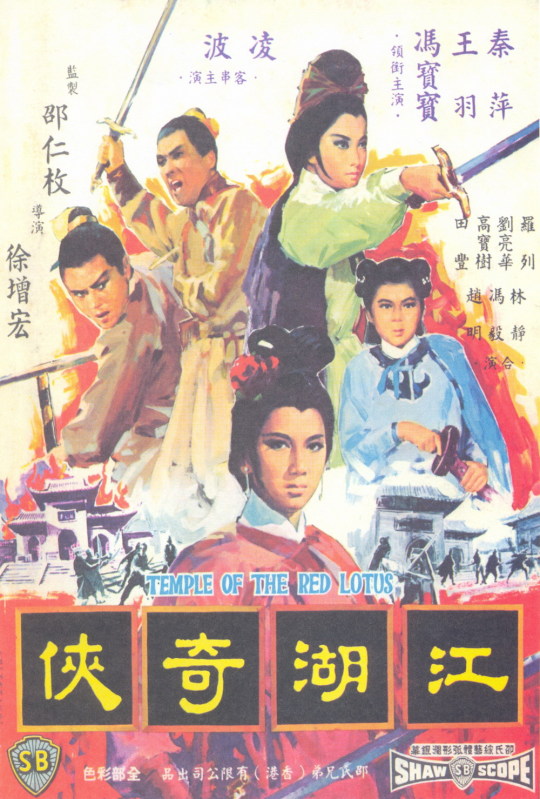
A long time ago, I watched “The Twin Swords” before I watched “Temple of the Red Lotus” not realizing these were part of a trilogy. Since so much time has passed, I re-started the trilogy by watching “Temple of the Red Lotus” last night. It’s such a great story and, of course, a fine example of Shaw Brothers’ quality film making. Wang Yu is the star but he doesn’t dominate the screen so much. It’s a tale of filial piety, revenge and righteousness over evil. Basically, Wang Yu is on a quest to avenge his family’s death but first he has to get married to his promised bride of the Jin Family. He convinces his new wife that they must leave the family home so he can fulfill his vow of vengeance. In order to do so they will have to fight the family members for their right to leave. The young couple chooses their moment based on the fact that the male members of the house are away on business so they will only have to battle the female members. Once they are out on their own, they encounter the evil Red Lotus gang who appear friendly at first. The Red Lady Swordswoman intervenes on their behalf and they are able to escape the Temple of the Red Lotus unharmed. All of the actors do a fine job and the story is engaging from beginning to end. I highly recommend this movie even if you’re not a Wang Yu fan.
#Wang Yu#Jimmy Wang Yu#Jimmy Wong Yu#Temple Of The Red Lotus#lo lieh#江湖奇俠#Ivy Ling Po#Chin Ping#Tien Fung#wuxia movie#wuxia films#wuxia#martial arts actors#martial arts actor#Martial Arts Movies#王羽 movies#王羽#凌波#羅烈#Fung Bo-Bo
1 note
·
View note
Photo
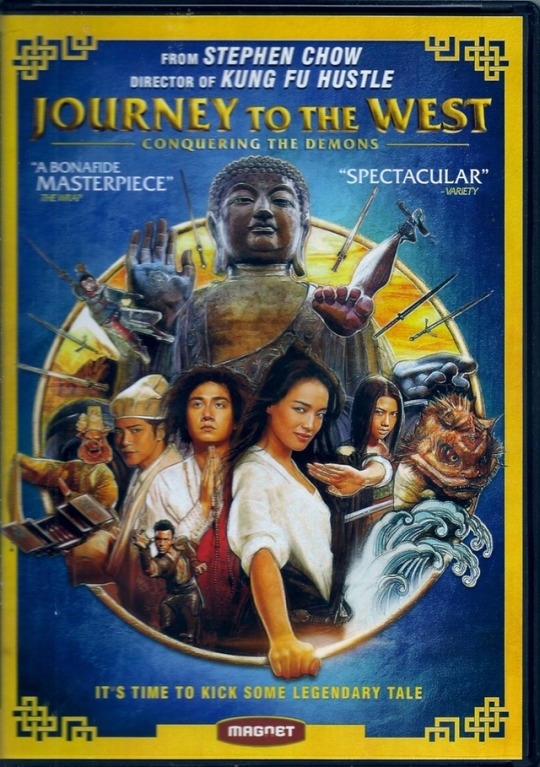
Bad movie I have Journey to the West or Journey to the West: Conquering the Demons 2013 Original Title Xi you: Xiang mo pian
#Journey to the West#Bingo Movie Development#Qi Shu#Zhang Wen#Bo Huang#Show Lo#Sheung-ching Lee#Bingqiang Chen#Sihan Cheng#Xing Yu#Zhengyu Lu#Chi Ling Chiu#Di Yang#Chrissie Chau#Hangyu Ge#Min Hun Fung#Lun Yeung#Chaoli Zhang#Wen Hui He#Yixin Tang#Yichun Chen#Zhanling Liu#Xiaochuan Huang#Yuwen Zhang#Min Xu#Jing Li#Journey to the West: Conquering the Demons
7 notes
·
View notes
Photo







Seven Warriors (1989)
#seven warriors#sammo kam-bo hung#terry tong#tony chiu-wai leung#jing chen#adam cheng#phillip chung-fung kwok#hark-on fung#lieh lo#jacky cheung#teresa mo#martialartsedit#80s action movies#Zhong yi qun ying#80s
42 notes
·
View notes
Note
In "Something Jermaine", How does Omi and Jermaine fighting with a pole fighters?



Well, they were both personally trained by Chase Young with those exact weapons.
So they’re well versed both in how to use one well and how to specifically counter the fighting style they’d both be using, which is why they’re pretty well matched, up until Omi got distracted.

Though I have absolutely no idea why Master Fung thought a spar of any kind would lessen the strain on their relationship, I imagine he picked the bo staff as their weapon because it’s not bladed, heavy, or metallic.
It was only ever going to make their rivalry flare up worse, but I guess Master Fung was simply looking for a non-lethal way for them to tire themselves and exhaust the bad mood out of them.
15 notes
·
View notes
Photo
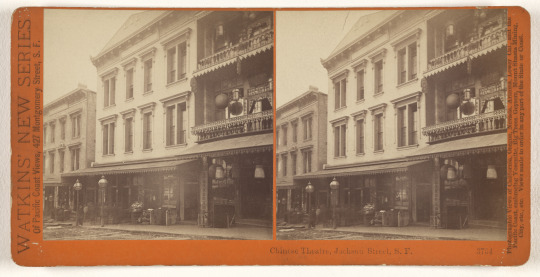
“Chinese Theatre, Jackson Street, S.F. - 3754” c. 1874. Photograph by Carleton Watkins (courtesy of CarletonWatkins.org).
When the New Chinese Theatre Came to Jackson Street
Many of Carleton Watkins’ photos of old Chinatown’s buildings tell more about the life of the early neighborhood than meets the eye, in this case, Chinese opera theaters. Casual observers would have found it difficult to distinguish the facades of the first theaters in Chinatown from other buildings. What set the performances apart would have been Chinese calligraphy denoting a theater, often written in red on the doors; a flag hung off a balcony; a row of paper lanterns over the doorway; and particularly the sound of gongs and Chinese violins filtering out onto the street. A ticket seller would have been positioned in front of the door to charge admissions.
Although all of old Chinatown’s theaters would be destroyed three decades later, Watkins’ 1874 photo of the Chinese Theatre and its adjacent buildings on Jackson Street’s 600-block still recalls a rich, boisterous era of Chinese opera that played out on both sides of the street between Dupont and Kearny Streets.
Thomas Chinn and the other editors of A History of the Chinese in California wrote in their syllabus for the Chinese Historical Society of America as follows:
“When the Chinese theatre presented its first performance in America on October 18, 1852, it did so in San Francisco (McCabe’s Journal, typescript copy preserved in the Sutro Library). That first Chinese troupe, the Hong Fook Tong had 123 performers and gave their opening performance at the American Theatre on Sansome Street. The prices ranged from $1.00 to $6.00 per seat. The last performance of that troupe took place on March 23, 1853, at the Chinese Theatre, on Dupont (now Grant Avenue) Street.”
The obvious demand for such entertainment resulted in the construction and opening on December 23, 1852, of the first Chinese Theatre, the building materials for which had been imported from China for assembly in San Francisco.
As the audience demand was high, the construction of other Chinatown theaters followed, particularly the establishment of the subject of Watkins photo -- the “New Chinese Theater” at 623 Jackson Street.
Numerous writers about Chinatown’s 19th century theaters frequently cite Lois Foster and her unpublished 1943 manuscript “Chinese Theatres in America,” for her account of the New Chinese Theatre’s opening in 1874 as follows:
“However, by the early 1870s, rival theaters were competing for Chinatown audiences. In the spring of 1874, certain affiliates of the Sam Yup group in Chinatown at last challenged the dominance of the Royal Chinese Theatre by erecting a rival house, the Sing Ping Yeun, which was thrown open to the public on June 20, 1874. The owners of the new theatre, said to have cost $50,000, were: Dr. Li-Po-Tai; Ah You, ex-Inspector of the Sam Yup Company; Ho Man, of the firm of Kum Wo; Ah Jarok, of the firm of Yee Tuck, and Ah Yung, agent for Dr. Li-Po-Tai. The elegant and superior members of this organization called themselves the Bo Fung Lin Company. . . .” (Foster p. 64)
Consistent with news accounts from that time and Foster’s research, the 1875 Bishop Directory’s dedicated listing of Chinese businesses contains an entry for the “Sing Ping Yung, New Chinese theatre,” at an address of 623-1/2 Jackson Street. Other business directories and newspapers of the day listed the Chinatown theater located mid-block on the south side of Jackson as variously located at 623 or 623-1/2 Jackson Street. The names for the new theater varied, such as the “New Chinese Theatre,” “Sam Yup Theatre,” “Sing Ping Yung,” or “Wing Tie Ping Theatre Co.” (presumably based on the name of a performance company).
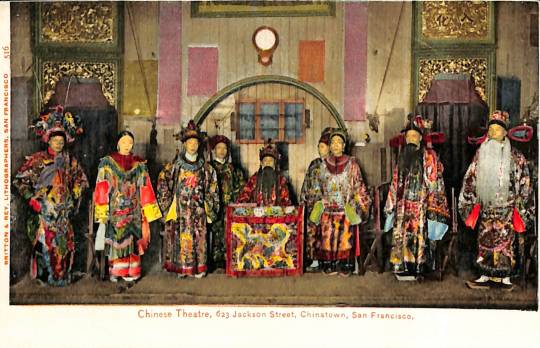
An opera company in full costume poses onstage for a photograph that served as the source for this postcard “Chinese theatre, 623 Jackson Street, Chinatown, San Francisco. Photographer or artist unknown, Britton & Rey Lithographers (from the collection of Wong Yuen-Ming). The Huntington Library has a copy of the card in its collection, dated 1905.
In addition to newspaper accounts, city maps made during the decade following the theater’s establishment clearly depicted its geographical footprint, interior plan, and location of at least three of its entrances.
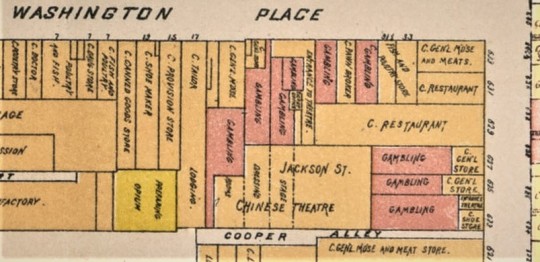
The location and entrances to the “New Chinese Theatre” located at 623 Jackson Street, as depicted on the San Francisco Board of Supervisors’ special committee map of July 1885 (from the Cooper Chow collection at the Chinese Historical Society of America).
Theater patrons, employees and performers could enter either by entering the building at its 623 Jackson Street and climbing a steep stairway to the theater on the upper floor, or they could enter the building by means of a passageway from Washington Place (popularly known as “Fish Alley” to English speakers or “Tuck Wo Gaai” [德和街], the name of a well-known business located on southeast corner of the T-intersection of Washington Place and Jackson Street. Persons desiring to enter or exit the theater could also do so from several sets of doors facing onto Cooper Alley which ran southerly from Jackson Street and into the mid-block.
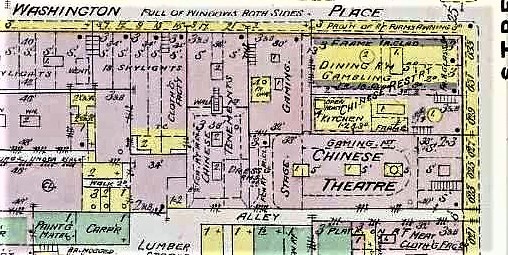
Detail of a San Francisco Sanborn map of 1887, showing details of the entryways to the Chinese Theatre at 623 Jackson from Jackson Street, Cooper Alley, and Washington Place (now named Wentworth), as well as its auditorium, stage and backrooms. Provided courtesy of Art Siegel for opensfhistory.org.
Competition between Chinese theaters often placed opera houses in conflict with each other, and violence often erupted with the aim of depriving a rival theater of its customers.
The opening of the New Chinese Theatre in 1874 placed it in direct competition with the older Royal Chinese Theatre located across the street at 626 Jackson Street. Morgan G. Boyd, in his 2012 master’s thesis, The Gold Mountain Theater Riots: A Social History of Chinese Theater Riots in San Francisco during the 1870s and 1880s (https://scholarworks.sjsu.edu/cgi/viewcontent.cgi?article=7770&context=etd_theses) surveyed the newspaper coverage of the competition and concluded that the Sze Yup theater on Dupont Street had also started to lose business to the Sam Yup-controlled, new theater on Jackson Street, which was playing to full houses. The Alta California reported the reason for the Dupont Street theater’s lack of patronage as “not being able to offer superior attractions” to the new theater on Jackson Street.
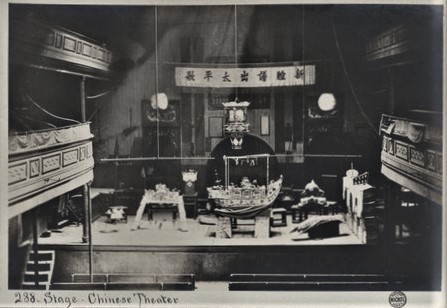
“288. Stage – Chinese Theater” c. 1895. Photograph by R.J. Waters (from the collection of the Bancroft Library).
In the 1870s and 1880s, San Francisco attempted to control Chinese theater operations in the form of city curfews on performances that ran past prescribed operating times. The enactment of theater ordinances occurred in response to complaints from non-Chinese residents about the noise produced by entertainment venues. As an example, a September 5, 1878, a letter from various citizens of San Francisco appeared in the Board of Supervisors column of the San Francisco Chronicle read as follows:
To the Honorable Board of Supervisors of the City and County of San Francisco: the undersigned, citizens of said city and county and residents in the block surrounded by Kearny, Jackson, Dupont and Pacific streets and Montgomery avenue, respectfully represent that the Chinese theater building structure on the northerly side of Jackson street, between Kearny and Dupont streets, has recently been repaired and altered by the construction of several new windows and openings, which have greatly increased the noises and discordant sounds emanating from said building during the theatrical performances therein …”
The enforcement of the local laws inevitably invited police raids during which police officers would break up a production and clear out the audience, often by clubbing Chinese patrons.
“Another reason that the Jackson Street house was faring better than its competitor,” according to Boyd, “was that during the Chinese holiday season the Jackson Street theater ‘has been kept open for day and night.’ Perhaps the authorities were lax on the Jackson Street theater while enforcing the entertainment curfew on the Dupont Street theater. In a facetious and extreme article by the San Francisco Chronicle subtitled ‘Chinese Theatrical Rivals on the Rampage,’ another cause was given: ‘One of the principal reasons was that ladies visited the former [the Jackson Street theater], and where they went male Mongolians, like their Caucasian brethren, were sure to go’.”
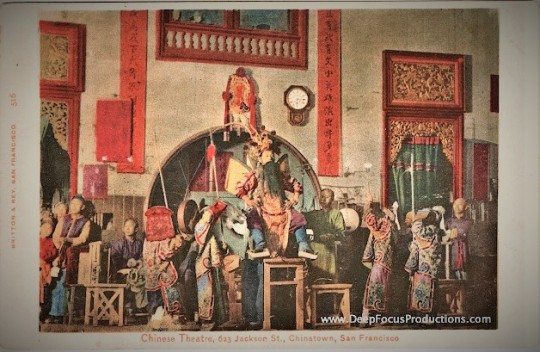
“Chinese Theatre, 623 Jackson St., Chinatown, San Francisco.” Colorized postcard by Britton & Rey Lithographers (from the collection of Arthur Dong).
In ensuing years, the competition often grew sharp with groups of employees trying to disrupt the operation of competing theaters. The newspapers of the day reported on the hijinks as part of the “theater riots” of the day. Boyd recounted an incident in 1878 as follows:
“Whether or not the actors were still under contract, and whether or not they had been imprisoned in the Jackson Street theater, is unclear. However, Chinese theater rivals in San Francisco during this time period were employing more and more brazen tactics against one other. In October of 1878, the San Francisco Chronicle reported that thirty-three Chinese men were arrested for obstructing sidewalks:
"’These fellows were in the employ of the Royal Chinese Theater, and last evening they took up their positions in the doorway of the new Chinese Theater opposite, which opened a night or two since to the lovers of the Celestial drama and refused to allow any one entrance. A posse of policemen charged them with clubs, and they would scatter and return again to their positions. During the melee bricks and cobbles were freely used by the Mongols, and an incipient riot was only averted by the arrest of the thirty-three prime movers in this Mongolian project.’“
Police attempts to enforce noise curfew laws and impose order on audiences only compounded the brawling between competing theater crews. After the Royal’s employees attempted blockade of the New Chinese Theater, the kinetics resumed days later, which the Chronicle reported as follows:
“The Chinese theatrical struggle was resumed about six o’clock yesterday evening, at the Sam Yup Theatre, on Jackson street, opposite the Royal Chinese (See Yup) Theatre. The Sam Yup, or new theatre, has a special attraction in a star of the first magnitude, and the theatre had been crowded to its utmost capacity since his engagement. Business jealousy is said to be the cause of the disturbances which have made his engagement rather more tumultuous than the bills called for; some Chinese claiming that the new “star” is a fraud; but there is another story going that the cause of the trouble is dissatisfaction felt at the partiality alleged to be shown to the new theatre, in being allowed to run until 2 A.M. while the two other Chinese playhouses are obliged to close at 1 o’clock. However that is, there has been a disturbance nightly at the new theatre. Last night the disorderly persons began throwing cigar stumps and other missiles on the stage. The only officer present was John Avan, and a part of the crowd wanted to fight him. He put one of them, named Ah Fong, out; but the latter climbed the stairs again, breaking windows as he went. Avan then arrested him, and took him down stairs, but encountered a crowd at the door some of whom took his club away. He then drew his pistol, when the crowd fell back, and he took his prisoner in and charged him with battery. Captain Short, of the Central Station, soon appeared on the scene with a squad of police, and cleared the street, which had become black with Chinese, who poured out of Dupont street to see or encourage the row. A large number of whites were in the crowd, and helped obstruct the street. . . .”
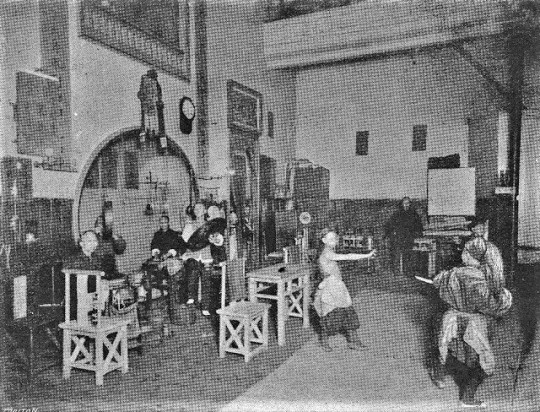
According to theater historian Bill Counter, “the photo appeared in an 1898 Strand magazine article that's reproduced on ‘Chinese Theatre, Chinatown..,’ a 2011 post of the Digital History Project. The magazine credited the photo to the Pacific Illustrating Bureau and mis-identified it as the ‘Stage of the Washington Street Theatre.’ Note the view of the second balcony at the top of the image. If we were at the Grand Chinese [Theatre] on Washington there would be a V.I.P. box on the level below that.”
During the 1880’s, the New Chinese Theatre would be listed variously in the Langley directories for 1880 – 1881 as the “Wing Tie Ping Theatre Co.,” at 623 Jackson (along with other small businesses at the address such as “Wing Lung, shoemaker” in 1882). In 1883, the Langley directory listed a “Chinese Theatre (new) 623 Jackson,” and it would continue to be listed as such through1895. After apparently being dropped from any listing in 1896, the theater would reappear in the Crocker-Langley directories from 1901 through 1905 under the “Chinese Theatres” entry which showed that Chinatown’s theaters had dwindled down to only two venues at 623 Jackson and 814 Washington (the Chinese Grand Theatre).
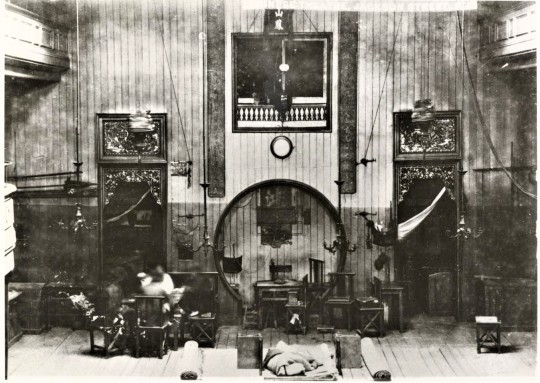
According to theater historian Bill Counter, the information for this photo from the Museum of Performance and Design Performing Arts Library is also incorrect. ���They identify it as from 1880s taken at the Royal China on Jackson St.,” writes Counter. “The street is right but not that Royal China name. That one was across the street. And as far as the Chinese name, they also mis-identify [sic] it as being the Donn Quai Yuen, the theatre on Washington St. that was also known as the Grand Chinese.”
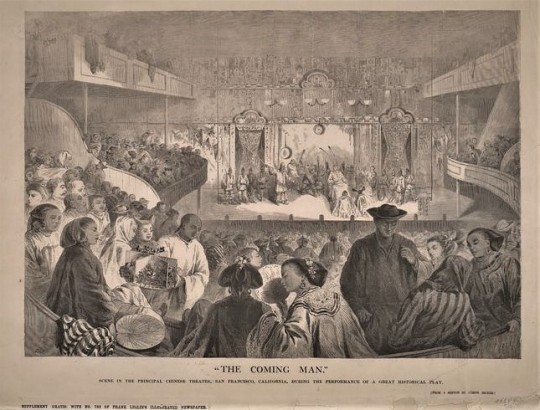
“’The Coming Man.’ Scene In The Principal Chinese Theatre, San Francisco, California During The Performance Of A Great Historical Play (From a Sketch by Joseph Becker)” c. 1880. The theater to which this magazine drawing referred was the so-called New Chinese Theatre at 623 Jackson Street in San Francisco Chinatown. The photographic record of Chinese opera performances during the late 19th century is negligible if nonexistent, with the only contemporaneous records being artists' sketches for the magazines of the day, such as Frank Leslie's illustrated Magazine. According to San Francisco theater historian Bill Counter, “[i]t’s another illustration from Leslie’s that’s on Calisphere from the UC Berkeley Bancroft Library. They don’t give us a date but credit Joseph Becker as the artist, Davis & Speer as the engravers and Frank Leslie (1821-1880) as the publisher. Becker nailed the balconies but took a few liberties with the architecture onstage."
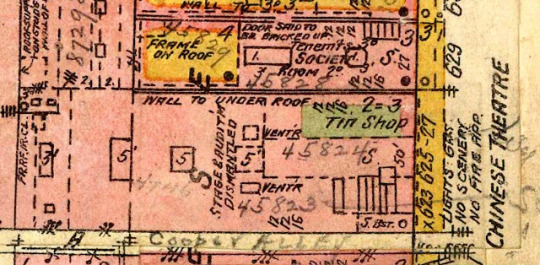
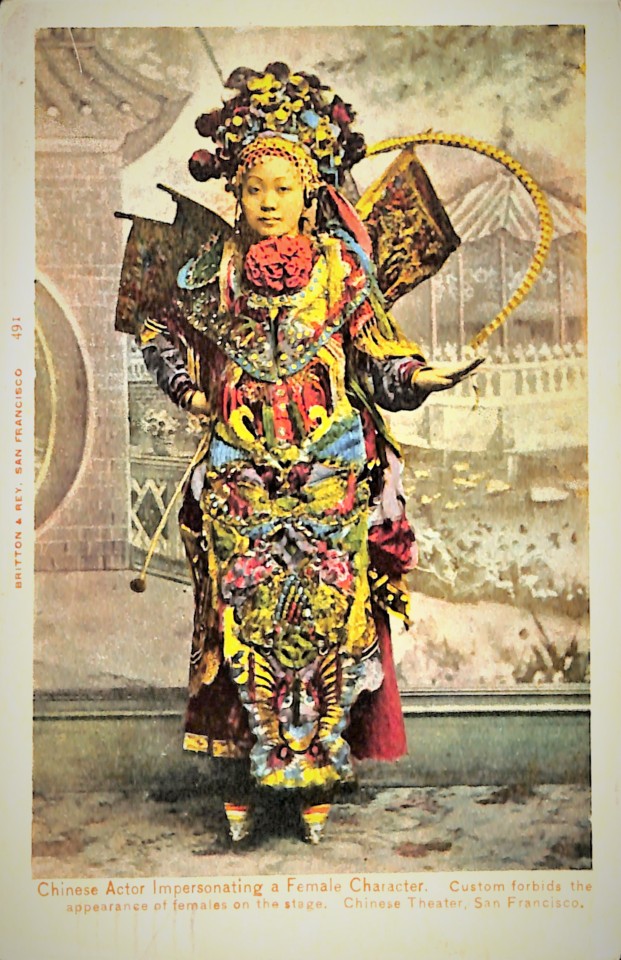
“Chinese Actor Impersonating a Female Character. Custom forbids the appearance of females on the stage. Chinese Theater, San Francisco.” c. 1904. Britton & Rey Lithographers (from the private collection of Wong Yuen-ming).
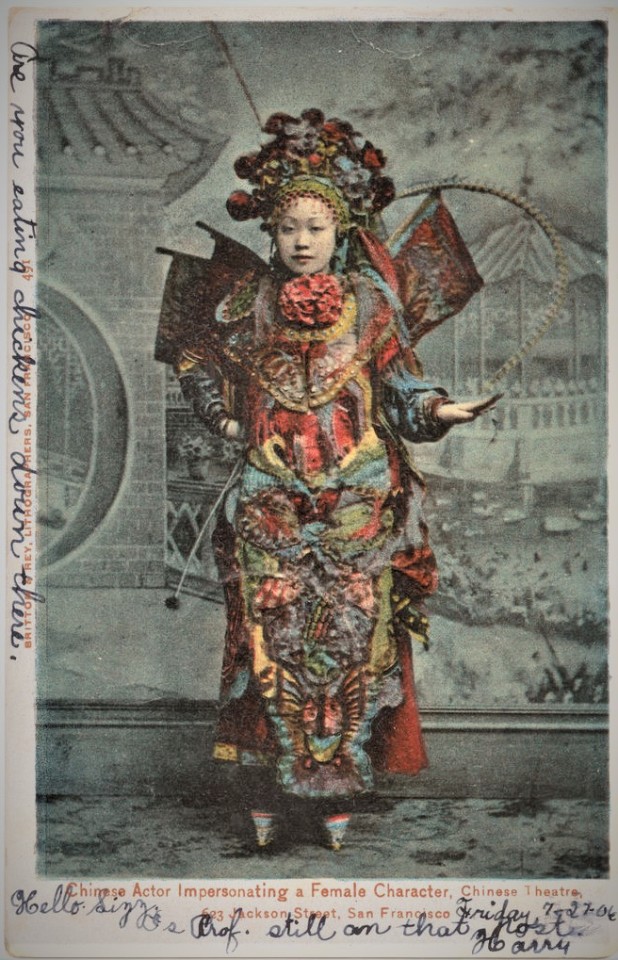
“Chinese actor impersonating a female character, Chinese Theatre, 623 Jackson Street, San Francisco.” This alternate version of the same image of the Chinese actor impersonating a female (c. 1904) provides an address of the theater (from the collection of the Division of Rare and Manuscript Collections, Cornell University Library).
Several other aspects of the theater building and its adjacent structures are worthy of note. The façade of the New Chinese Theatre at 623 Jackson Street attests to the fact that the locations of Chinatown’s various entertainment venues were indistinguishable from the general architecture of the neighborhood’s other buildings. None of the Orientalist motifs that would be observed as adorning the movie houses of post-1906 Chinatown were used on the buildings of old Chinatown’s Chinese opera venues.
The theater entrance, moreover, constituted a minor part of the building frontage shown in photos by Watkins and others.
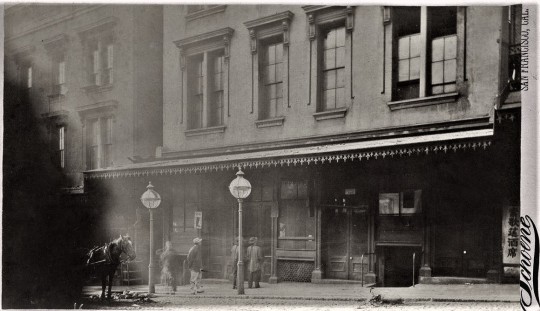
Passersby check the entertainment offerings outside the New Chinese Theatre at 623 Jackson Street on the south side of the street, no date. Photographer unknown, published by Schoene co. (from a private collection).
According to the Bishop directory of Chinese businesses in 1875, two businesses, shared the address, i.e., “Sue Lee, fruit and nuts,” at 623 Jackson, and “Sam Yung, tea and rice” at 623-1/2 Jackson St. The next address, slightly up the incline of the street, was the “Ong Wo & Co., general merchandise” business at 625 Jackson. 627 Jackson served as the address and entrance for the “Fook Yul, boarding,” “Kwong Yue, opium,” and “Wung Yu, tea and rice” operations.
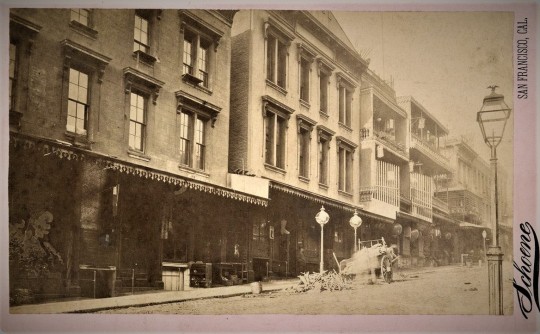
The frontage along the south side of the 600-block of Jackson Street, no date. Photographer unknown, published by Schoene co. (from a private collection). The theater building appears in the center, and the Yen Nem restaurant’s two balconies are seen on the fourth building seen up the hill from left to right.
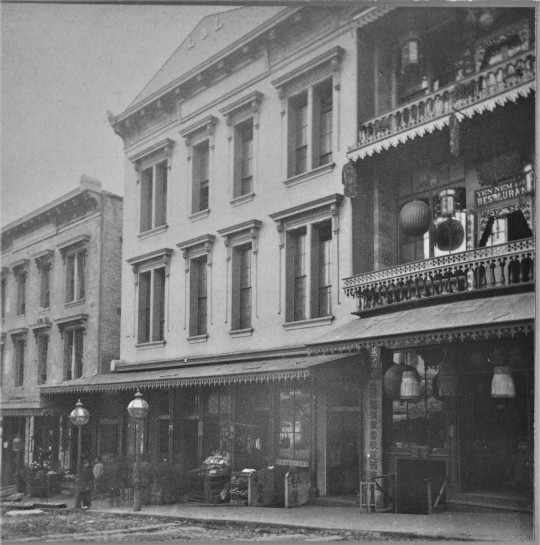
Close up of the “Chinese Theatre, Jackson Street, S.F. - 3754” c. 1874. Photograph by Carleton Watkins (courtesy of CarletonWatkins.org). Chinese opera patrons can be seen (at left) waiting to enter the theater. A portion of the adjacent restaurant appears at right.
The Watkins photograph of the south side of Jackson Street’s 600-block show the signage of “Yen Nem & Co Restaurant” across the center of the second floor balcony and the plaque in Chinese characters 燕南樓 (canto: “Yeen Nahm Lauh”) above the ground floor entrance. For the next half dozen years, the restaurant would continue to appear in listings variously and at alternate addresses as the “Yennem Low (Chinese) restaurant,” at 629 Jackson or “Yen Nam Low & Co.” and the “Yen Nem Low restaurant” at 627 Jackson. The vertical sign at the left of the building front contains common banquet services advertising as follows: “燕南樓包辦滿漢葷素歌筳酒席”(pinyin: Yàn nán lóu bāobàn mǎn hàn hūn sù gē tíng jiǔxí; canto: “Yeen Nahm Lauh bau baan wuhn hon fun soe gaw ting jauh jik”). The restaurant would change hands such that by the Langley directory of 1881 Langley, it would be the 629 Jackson Street location of a well-known pre-1906 eatery, “Been Sun Low.”

“Marketing,” c. 1896 -1906. Photograph by Arnold Genthe (from the collection of the Library of Congress). Historian Jack Tchen asserts that the grocery store in this photo is the Kwong Hop market located at 621 Jackson Street in the adjacent storefront east of the entrance to the Chinese theater. “The continuity of display styles between this photo [and other stores] indicates certain standards by which grocery owners abided,” Tchen writes. “The lantern second from the far left has two phoenixes drawn on it. Phoenixes traditionally symbolize joy and happiness.”
By the time the city’s 1905 Sanborn map was produced, the New Chinese Theatre at 623 Jackson had gone dark.

1905 Sanborn map showing a non-operating Chinese Theatre (courtesy of opensfhistory.org). The map shows the theater use has ceased and the dismantled state of its stage and auditorium.
One can surmise that the first two decades of the Chinese Exclusion Act had not only drastically reduced the Chinese population in San Francisco and throughout the US, with a consequent decline in Chinese opera patronage. The great quake and fire would destroy the entire building, but history had already turned the page for a new era of Chinese opera in the US.
[updated: 2025-2-15]
NOTE: To read Bill Counter’s excellent, and updated, article from which this post is heavily drawn, go here: https://sanfranciscotheatres.blogspot.com/2020/05/new-chinese-theatre.html
#New Chinese Theater on Jackson Street#Yen Nem & Co. Restaurant#Yen Na Low#Bun Sun Low#Chinatown theater riots#Jackson Street#Washington Place a.k.a. Fish Alley#Schoene photos
2 notes
·
View notes
Text
o, a tak nawiązując do mojego wczorajszego dialogu z herbatkami Chase'a i Guana
To co powiecie na taką sytuację
Chase: Guaaan Jak mnie dziś zdenerwowanooo Guan: kto? Chase: <sweats, bo nie chce powiedzieć, że Wuya, bo Guan ma o niej takie a nie inne zdanie> ZDENERWOWALI MNIE. I TYLE <krzyżuje ręce bo foch forever> Guan: <wstaje> Czyli nic tu po mnie. Chase: .......Stój. Guan: <siada z powrotem> No, to kto? Chase: Wuya. Guan: O rajuśku. Chase: ........ Uciekła do koleżanki, bo dałem jej bana na wu. Guan: Dałeś jej co? Chase: ZAKAZ. Żargon młodzieży 21 wieku. Znam się tylko dzięki Ashley. Guan: Dzięki komu? Chase: GUAN, TY WEŹ SE ZAŁATW WTYKI jak ja - będzie prościej jak będziesz wiedział co się dzieje w konflikcie xiaolin-heylin a nie SCHOWASZ SIĘ w tej swojej świątyni i zadowolony. Nic się nie interesujesz. ten stary dziad Fung już nic nie ma do zaoferowania adeptom. Czynienie zła robi się coraz prostsze. ZERO WYZWAŃ OD WAS, XIAOLINÓW. <kiwa głową na 'nie'> zero satysfakcji jak ofiara nie wieżga i jest za łatwa do schwytania. Guan: ...........<angry but stoic discontentment> No DOBRA! Zatem zastanowię się bardzo poważnie nad trenowaniem ich w swoich włościach! Chase: No nareszcie dobrze prawisz. Guan: Tak, w taki sposób moje baczenie na twe poczynania się polepszy Chase: Żebym ja ci tego baczenia nie przekrzywił. Guan: Co? Chase: Co? Guan: czy ty właśnie mnie zmanipulowałeś do zrobienia czegoś pożytecznego, bo w głębi duszy, podświadomie chcesz, aby Xiaolini przezwyciężyli zło ? Chase: NIE, PRZECIEŻ POWIEDZIAŁEM, ŻE NUDNO SIĘ ROBI, BO SĄ CIENIASAMI, GUAN. Ja łaknę w miarę wyrównanej konkurencji, bo wygrana z dzieciakami to żadna satysfakcja. Guan: Tak sobie tłumacz~ Ale Kimiko miała rację, że jesteś tsundere. Chase: ......... JESTEM CO? Guan: T S U N D E R E. Dziewczęta na mojej ostatniej wyprawie do Japonii to mówiły, to ja się zapytałem Kimiko. Co, tylko tobie można iść z duchem czasu? Chase: Hm. Guan: Hmmmm~ <nods> <awkward silence> Guan: No to co z tą Wuyą? Chase: Hmm? <odpłynął i nagle wrócił na odgłos jej imienia> Guan: No bo tak jakoś... przychodzisz po porady do mnie jakiś czas, ale w połowie drogi się rozmyślasz... ALbo mi mówisz szczątkowe info, na bazie których nie wiem jak pomóc no i no i tak... NIE WIEM JAK CI POMÓC, NO. Chase: <sfochowane hmpf!> Guan: <głośne westchnięcie> NIE POPIERAM TEGO, ale jesteś moim przyjacielem i nawet jeśli jesteśmy wrogami - chcę twojego szczęścia. Z twoich relacji wynika, że to ty jesteś niezdecydowany w tym związku, dlatego też.... hmmm nie wiem zabierz ją na randke??? W jakieś ładne lub <kaszl kaszl> POTWORNE miejsce? Chase: <tik nerwowy> Guan: Oh! Albo nad wodospad! Lubisz te wszystkie strumyki i szum wody! <zaczyna się rozmarzać Dashi style, co wkurza chase'a> Tak! Piknik nad wodospadem! Oh, i żeby pokazać, że ci zależy, kup jej jakąś biżuterię! Chase: <existential crisis> Guan: A potem splądrujcie jakąś wioskę czy co wy tam heylini robicie dla rozrywki... Tylko poinformuj mnie którą, żebym ja i moi bracia mogli przynieść pomoc tym biednym ludziom. Chase: Czekaj. Stój.... Tobie się wydawało, że przez cały ten czas ja i Wuya jesteśmy razem? Guan: <patrzy w lewo, w prawo pełen zdziwienia> A nie? Chase: ... WYJDŹ. Guan: Że co proszę? Chase: <aż wstał, wkurzony> W Y J D Ź!!! Guan: <macha rękoma, wskazując na poszczególne elementy natury> JAK MAM WYJŚĆ, SKORO JESTEŚMY NA ZEWNĄTRZ!? Chase: Oh, czyli pomóc ci!?? <pstryka palcami i pojawia się portal> WON. Guan: Bywaj, przyjacielu. <wchodzi przez portal> Chase: <kiedy zniknął portal> <foch again> NiE jEstEśMy kOleGamiIi tymczasem, gdzieś po drugiej stronie portalu Guan: <wyszedł> Hm. Coś wietrznie tu. <patrzy na dół a tam bezkres oceanu> .... AAAAA!!! <spadł do wody>
Chase, później: ALEXA, CO TO ZNACZY TSUNDERE? Chase, jeszcze później, przy myciu zębów: PIEPRZENI SHIPPERZY.... Ashley z Guanem by sobie ręce podali...
gdyby guan się udzielał w internetach na stronie wyznań: My bff enemy-zoned me AGAIN bc I shipped him with his evil witch gf, who apparently wasn't his gf at the time. + points if ppl responded with zuko's line: That's rough, buddy.
no więc tak: kiedy twój ex-przyjaciel chce być twoim wingmanem, ale masz dość, że wszyscy na heylin forum (włącznie z toba, ale się do tego nigdy nie przyznasz) ciebie shipują z wiedźmą, więc każesz mu znaleść w środku lasu drzwi, aby zszedł z twoich oczu.
<wheeze> Guan, wściekły: CO!? MAM SOBIE WYCZAROWAĆ TE DRZWI CZY CO? Chase: Uuuugh. Dashiego nienawidzę bardziej, ale z tym to by sobie poradził. Pieprzony wynalazca Guan: I co? Drzwi byłyby shen gong wu? Chase: taa, czemu nie. duch dashiego: REETY CHŁOPAKI CZEMU NIE BYLIŚCIE TACY POMOCNI KIEDY ŁADNIE WAS PROSIŁEM 1500 LAT TEMU? chase, niemalże natychmiast: <rzucił w niego włócznią, a ten się rozpłynął w powietrzu> guan: ej, nieładnie! chase: ZROBIŁEM TEMU ŚWIATU PRZYSŁUGĘ! WIESZ CO BY BYŁO GDYBY DOBRAŁ SIĘ DO MEMÓW!? ~ chase young - w sekrecie ratujący świat od stania się heylińskim potworem
i tak podsumowując, oto i jak ja piszę charakter Chase'a ktoś: <mówi niewygodną prawdę> on: Wyjś. ktoś: <drąży czemu, przecież nic nie zrobił> chase: WYJŚ, ALBO CI POMOGĘ ktoś: Ale- chase: MOJE KOTKI ZARA SPRAWIOM, ŻE NÓŻKI CI WRÓCOM _________ Guan: o rajuśku. Chase: Jaki Rai, Guan? My tu o Wuyi, nie o Raimundo. Poza tym, ja jestem TEAM OMI, nie zmienisz mojego zdania.
Chase: Nigdy nie wygonię Omiego, bo jest moim ulubieńcem. Omi: Dobro jest w tobie silniejsze niż sądzisz. Chase: ........ Z wielkim żalem w sercu (gdybym je miał) W Y J Ś. Chase: Oh, i Jermaine teraz ty jesteś moim ulubieńcem. jack: <smuteg> Jermaine: <udawany entuzjazm> Jejjj~ -_- ______________
Mama Chase'a ucząca go podstawowych zasad przetrwania mama: Jak nazywamy nieznajomego, który podchodzi do ciebie i nawiązuje na pozór koleżeńską rozmowę? 6-letni Chase: Podejrzany jegomość. I mam jak najszybciej się od niego oddalić. mama: Bardzo dobrze! A jak nazywamy Pana, który chce ciebie przekupić poprzez wydanie pozwolenia na pogłaskanie należącego do niego kota? CHase: PRZYJACIEL mama: KoChAnIe N I E. ____________________________ ej a tak wracając do ślubu Raia Rai: <kroi tort, jakby był zmęczony życiem od 10 roku życia, bo Chase i Guan zepsuli mu dzień> Guan i Chase: <biją się, bo ustawka> Pani Pedrosa: Koniec tego dobrego. <krzyczy na nich po portugalsku> oni: <głupio im> <posłuchali się Pani mamy i odeszli od stołu w ramach kary> tymczasem my: hue hue pora ich dobić memelord: DObra, jaki plan? Zagadujemy tak 'nieostro' czy od razu z buta 'ale z was frajerzy'. medeaminte: TBH Head empty, only Raipunzel and Chuya. memelord and narvana, simultanously: Y E S. narvana: Anyway. Ladies, watch. narvana: HAHAHA OTO CO DOSTAJECIE KIEDY PSUJECIE WESELE MOJEGO RAIA I MOJEJ ROSZPUNKI WSTYD I HAŃBA LOL Chase: grrrrr Guan: <zagradza mu drogę ramieniem> NIE. PANI PEDROSA PATRZY. Chase: <uspokoił się, ale rzucił nam TO spojrzenie> chwila ciszy medeaminte, tak z dupy: Ej, Chase a kiedy ślub z Wuyą, bo jestem ciekawa. memelord and narvana: <wheeze> Chase: <coś pomiędzy szokiem a zniesmaczeniem> Guan: Nie, ale to dobre pytanie w sumie. Chase: ... CZUJĘ SIĘ BARDZIEJ ZDRADZONY NIŻ 1500 LAT TEMU gdy Hannibal pokazał mi twój hologram! memelord: O, patrzcie! Roszpunka będzie rzucać bukiet! Te, ale byłoby śmisznie gdyby Wuya złapała haha Chase: Dawno moje kotki się z tobą nie bawiły. memelord: Przemsań mi grozić, bo powiem im, żeby ci zupy nie dawali. <zignorowała go i mówi do was> Nie no ale gdyby tak się stało, to jak śmieszkować kocham, idę na parkiet i tworzę nowego tańca połamańca. tymczasem Roszpunka rzuca i traf chciał, że Wuya, nie uczestnicząc w łapaniu bukietu - dostała go, bo wylądował jej na talerzu medeaminte: <dying from happiness and laughter> narvana: haha co LOL memelord: <wyskakuje ze swego siedziska, wali się wielokrotnie w kolano, bo nie może aż w końcu kładzie się na podłodze i tak rży> Clay, z pączem w ręku: ... Dziewczyny, to dokuczanie mistrzom gorzej wam wchodzi niż alkohol cioteczce Zuzannie po rodeo z indykiem jako pasażer. medeaminte: <wheezing to the table> narvana: <still sitting straight but slowly losing it> Guan: ??? Chase: ULTRA FOCH ACTIVATED. WEDDINGS ARE HORRIBLE.exe AND I'LL HOLD THE GRUDGE FOR ETERNITY.png installed
Ashley: <slides to the wuya the moment she saw the bouqet> Mogę być druhną? Wuya, blushing: Wyjś. Jack: A to chyba tekst Chase'a Wuya: <patrzy się na niego z ochotą mordu> Jack: To znaczy, że też nie mogę być druhną? ____________ Tylko jedno w głowie mam Ustawka co 5 lat Wiedźma mi uciekła do krainy świata Ying-Yang W głowie myśli mam Kiedy skończy się ten stan Gdy już nie będę chloł Bo to wszystko wina Dashiego.
PET, FCE, CAE, CPE, IELTS
Fung: -Jego mózg nie reaguje, odciął się od przyjmowania większej ilości bodźców. Tego się spodziewałem. Myślicie, że czemu nie przytulam swoich uczniów? Dojo powiedział mi, że jestem tak dobry w przytulaniu, że chi odpływa daleko do jaźni i ciężko delikwenta wybudzić z takiego stanu. Dojo: niebieskooki dobrze gada. Ja tam odpływam gdy on inicjuje uścisk. Dlatego dzieci, zastanówcie się gdy bd chcieli go przytulić na dzień ojca.
Rai: came back from 6 months of absence Fung i Clay: We're gonna hurt this boy. Rapunzel and Rai: oh no Fung: SON. Rai: ... What? Clay: You're my bro, bro. Rai: <already crying> Whhaaaatt!?? Dojo: <crying too> I was so worried I couldn't eat properly!!! Rai: Oh noo SorRy bUdDyyyyy <hugs dojo>
ja: W skali od 1 do 10 jak bardzo ci było smutno z powodu Raia? Dojo: A ile mam lat? ja: O jejku dojo nieee (przytula gadzinę i jest jej podwójnie smutno)
Chase: ta, pusto tu było bez ciebie Rai: Co, dać ci może jeszcze BUZI? memelord:
Chase: Raimundo, a może zainteresować się tobą? Rai: Nie, dziękuję Chase: jesteś pewien pewien pewien? Rai: MAM DZIEWCZYNĘ WEŹ IDŹ CMOKNIJ LEWKA
Rai: <przestał obijać chase'a> Chase: hahaha!! Chłopcze, gdybyś wiedział na ilu ustawkach byłem w życiu to też miał byś gdzieś ból fizyczny! Ruszpunka: <cisnęła w niego wiązką światła> Chase: <odskoczył w porę> nie jestem martwy, ale było blisko
1 note
·
View note
Text
18/09/21 ore 416 E nulla le brutte abitudini nn si perdono mai.. sono sempre le tre e un quarto di notte come ogni volta o quasi in cui scrivo.. chissà quando smetterò di star sveglio così a lungo la nottee . Troppi pensieri in sto periodo però cazzo avrei voluto essere uno che non ha emozioni stronzo fin al midollo perché giuro che non mi fa per nulla bene soffrire così. In tutto questo ho anche il cel che senza Wi-Fi ha la rete dati che nn va anche se prende a palla ceh nn funge bo spero presto di andarlo a far vedere così vedo se sanno cos e o da cosa è dovuto sto mal funzionamento 🤷🏻♂️🤷🏻♂️comunque bo in sti giorni ho i piedi che fanno un fastidio tremendo causa delle mille patologie da cui sono impossessato e nulla spero passi.. altro? Ah si mio padre che mi crede un coglione imbecille solo perché sono disabile sta cosa comincia a mandarmi in bestia a 25 anni suonati e capisco che nn aiuta il fatto di star cercando di prendere la patente solo ora però prima purtroppo sono stato impossibilitato vuoi o nn vuoi da mille cose, ma il fatto è che mi incazzo soprattutto perché so che quando avrò la patente sarà simile ad adesso perché tanto non potrò andare da nessuna parte dato che sono disabile e non so (secondo lui) come fare a muovermi e cosa fare in generale anche se divento 24 ore su 24 sulla mia pelle penso di averlo già imparato è Stra imparato e di essere già entrato nel mood ma che ci voglio fare? Sei un genitore apprensivo è apprensivo nessuno li toglierò mai dalla testa certe cose, Anzi spero che piano piano (Anche non piano piano che è meglio) impari a capire che sono una persona normale e che può fare tutto nella vita di tt i giorni esattamente come gli altri ragazzi. E dato che ho pensato chi magari cominciando prendendo la patente e passare l’esame al primo colpo Magari è un primo passo per fargli prendere più fiducia in me e poi ugualmente prendere anche la patente con l’ esame di guida e vedere come va la sua fiducia iniziando a guidare ogni giorno e diventare sempre più ferrato, così se gli faccio vedere che sono sicuro di me, nonostante essere il più sincero possibile capirà che a me serve un po’ più di spazio di libertà per certe cose e che non mi serve nessuno dietro il culo nonostante io non abbia non gambe al 100% funzionanti.. vabbè ma tanto primo poi (credo prima che poi) scriverò sicuramente altro sulla patente e di come sta andando perché per ora non mi pronuncio dato che c’è ancora burocrazia in corso e devo ancora iscrivermi però sto iniziando a studiare su un’app per conto mio; non mi scarta vetro più le palle su questo e continuo cn altro allo. Per esempio oggi ho fatto una partita o due con i miei amici di Milano e dintorni sulla play e niente ci siamo divertiti come dei pazzi spero che questa cosa continui così almeno mi riempio le giornate o almeno i pomeriggi e cerco di non pensare al resto(Spero senza togliere tempo a pulizie lavaggi di piatti eccetera); più o meno è andata così: abbiamo un gruppo su WhatsApp dove ci siamo io questi due miei amici di Milano e un terzo che però è un amico di uno dei due E che si è voluto aggiungere tempo fa, avevo detto che ero libero oggi pomeriggio a giocare perché avevo sentito i miei due amici che avevano detto così anche loro ma alla domanda sul momento mi hai risposto solo quest’altro allora ho deciso di iniziare a giocare con lui. Il problema stava nel fatto cheOltre a lui c’erano altri tre suoi amici o2 forse, non ricordo E niente già non gioco a Fortnite da una vita, figuriamoci con la play che macello perché è da tanto tempo che non gioco ne ho mai giocato in modo ossessivo quindi non sono bravo per niente e secondo mi vergogno facilmente dato che non sono bravo quindi questi hanno cominciato velatamente a prendermi per il culo sulla skin Che avevo e sul mio modo di giocare diciamo quindi la partita dopo che sarebbe stata però non nel solito campo ma nella modalità creativa (la modalità che mi piace di meno perché e tutta strana e non l’ho mai capita) allora ho lasciato il gruppo e gli ho lasciati giocare per conto loro. ()•Pt2 ⬆️
1 note
·
View note
Text
Faye Wong's career: Hong Kong never changed her (2010)
by Wu Qi
The impact that Faye Wong left in Hong Kong can still be felt in this world today where trends are constantly changing. When the media mentions Faye Wong, they refer to her as "Heavenly Queen". Every time she returns to Hong Kong to go shopping, it still causes a frenzy for the paparazzi.
The streets of Hong Kong in August are busy. Our reporter wanted to see where Faye Wong first became popular. However, Alvin Leong, her music producer for many years, said that the recording studio on Kimberley Road where Faye Wong’s first audition was held in 1989 is now gone. And S&R studio on Hankow Road, where he produced her first few albums, was closed around 1997.
Instead, we met at AVON recording studio on Nanking Street in Kowloon where Faye Wong recorded the famous song FRAGILE WOMAN. This location is not very spacious, but it occupies two of only three of the remaining professional recording studios in Hong Kong today. Hong Kong's recording industry was once a big star-making factory. Now looking back at the golden age of the 1980s and 1990s makes people feel a bit emotional.
Intentionally or unintentionally, Faye Wong and the Hong Kong pop music she represented in the 1990s reached a legendary climax and ending.
She once led Hong Kong trends and left her mark as a maverick. But few people saw her innermost silent struggles. Chan Siu Bo, the owner of Cinepoly Records, regarded it as a conflict between a Beijing girl and Hong Kong culture. And in the end, her individuality was bigger than this city that could have drowned her. She could let go of her reputation and work, but she could never let go of her character. She was true and stubborn.
In the eyes of those who know her, there are only two kinds of people in Faye Wong's world: acquaintances and strangers. Among acquaintances, Faye Wong is compatible with those who are straightforward and natural and she regards them as friends. For people she doesn't know well, she never tries to figure them out and often ignores them.
Music critic Wong Chi-wah told our reporter that before Faye Wong, there were almost no female pop singers in Hong Kong who expressed themselves through their creative work. The producers were always in control of female singers. However, Faye Wong and her producers collaborated together. Hong Kong people could see a different culture through her eyes. As Faye Wong expressed in her song EXIT — "I have a lot of problems that can’t be solved; I lack patience and nothing can satisfy me; I often offend people, which seems to be a natural talent; I hate being famous, but also want attention." It was a combination of Western pop music, Hong Kong culture, as well as northern China’s culture that liked to explore the meaning of music. As she herself said, "If you don’t have feelings for it, how can you perform it? This [making music] is not as simple as making a shirt." Music critic Fung Lai Chi said that Faye Wong's songs never stopped expressing herself. From early Cantopop to AOR (Adult Oriented Rock), she bid farewell to R&B and then absorbed trip hop and psychedelic electronic music. In the world of music, she was looking for an exit.
"Mainland Girl" Wong Jing Man
"What songs have you listened to recently?"
"There’s a song called HOWEVER THAT DAY, it sounds very good!"
"Who sang it?"
"Wong Jing Man."
"Wong Jing Man?! No way, you are so corny! How can you like her?"
At Metro Radio Station in Whampoa Garden in Hong Kong, Lin Boxi described to our reporter the attitude of Hong Kong girls towards Faye Wong back then. Lin Boxi was born and raised in Hong Kong and is very local. He spoke Cantonese while vividly describing Wong Jing Man of those early years.
"Hong Kong fans were snobbish. At that time, I felt that everything in the Mainland was inferior. The singing from the north was very old-fashioned. Generally, girls liked Shirley Kwan, Vivian Chow, and Sandy Lam. Everyone knew that Wong Jing Man sang well, but she was not trendy so her songs were not popular!"
Lin Boxi said that he was in high school when Wong Jing Man made her debut in Hong Kong. Now as a well-known radio DJ in Hong Kong, in his analysis, her identity as a "Mainland Girl" was an obstacle for Hong Kong people to accept her as a singer.
Today, the streets of Hong Kong in August are hot. But there are no big stars in the colorful magazines that can touch the nerves of all the Hong Kong people. The birth of Gigi Lai's daughters and Dai Si Chung's death occupy the most pages. However, in the past two days, the media found old photos of Dai Si Chung and his student Faye Wong. In the photo, Faye Wong had a mushroom hairstyle, thick eyebrows and red lips. She wore a red-gray crop top showing her waist. Her expression was flat. The caption next to the photo said: "Faye Wong in the old days. Although she could sing, no record company was willing to sign her."
Most people don't know that Faye Wong's mainland identity was actually not a bad thing for the record company that signed her.
Chan Siu Bo, the owner of Cinepoly Records, liked her "Mainland Girl" background - it represented a market that could be developed. Hong Kong people used to call Chan Siu Bo the "Little Treasure". He was a famous DJ in the 1980s and then became owner of Cinepoly Records under the subsidiary of Polygram. His company became popular because of Faye Wong, Beyond, Leslie Cheung, etc. Chan Siu Bo now in his early 50s, has returned to Metro Radio to be a DJ. He can speak relatively fluent Mandarin, which is not so Hong Kong-like. Both of our chats were conducted at Metro Radio in Kowloon.
Chan Siu Bo told our reporter that when Faye Wong appeared in front of him in 1988, it was a period of time when he was busy drinking with his friends and bidding them farewell. "Hong Kong’s return to China in 1997 was getting closer. Hong Kong’s emigration wave began in 1980. It was almost 1990. It seemed that every day there were friends who wanted to emigrate and bid farewell. In the end, I decided not to leave. I was thinking that if I had the opportunity to sign a mainland singer, it would be great."
Chan Siu Bo said that at that time, Dai Si Chung called him and introduced a student from Beijing named Faye Wong and wanted him to listen to her tape. "The students introduced by Mr. Dai were usually pretty good." Faye Wong's tape was in the hands of Alvin Leong, a producer at Cinepoly. Alvin Leong was born and raised in the United States. After finishing high school, he studied for another year in college and then went to Hong Kong for summer vacation when he was recruited by Universal Music. He maintains a beautiful mustache and speaks very gently and humble. Thinking back more than 20 years ago, he spoke about the success of his and Faye’s collaboration: "It just so happened that the music we enjoyed was very similar. Ah Fei and I were both outsiders with nothing to bond us except for the music that we enjoyed.”
In the 1980s, Alvin Leong said that he was very busy every day. "At first, I didn't care about Faye Wong's tapes at all. Every day someone brought tapes over and wanted to listen to them." A few months later, he accidentally picked it up and listened. Faye Wong sang a song by Teresa Teng, "The hairs on my arms stood up when I heard it. It sounded so impressive!"
Then, Chan Siu Bo also heard Faye Wong’s audition of Teresa Teng’s song SMALL TOWN STORY: "Compared with the average Hong Kong person, I have a sense for Mandarin songs. I was very excited. When I took the taxi, the driver was listening to Teresa Teng’s song. I took out Ah Fei’s tape and said: Change it to this and listen, it sounds like Teresa Teng.” Today, more than 20 years later, Chan Siu Bo no longer remembers the driver’s reaction. He only remembers his excitement. The music man had found someone who could sing.
Chan Siu Bo said that although he was born in Hong Kong, the influence of his parents in Shanghai far exceeded the narrow boundaries of Hong Kong. "Although I hadn’t been outside of Hong Kong much, in terms of music, I felt like I had gone to university abroad."
The first boss and first music producer Faye Wong met in Hong Kong happened to be not very "Hong Kong-ized." When Chan Siu Bo told Alvin Leong that this mainland girl couldn't speak Cantonese, Alvin thought: “When I returned from the United States, I couldn't speak Cantonese either!"
Very simply, after listening to the two songs recorded by Faye Wong, Chan Siu Bo decided to sign her. "When I think about it now, I was too daring." Chan Siu Bo said that he had never even seen Faye Wong's face at the time and there were clearly inaccurate pronunciations in the Cantonese song that she auditioned. "She was a little girl of 18 or 19 years old. If you can’t learn Cantonese well in your 20s, then the music business will be difficult to handle.” At that time, Hong Kong had no market for Mandarin songs. Chan Siu Bo recalled that the publicity department manager, nicknamed "Red Bull", rushed into the room and said, "Did you sign a "Mainland Girl"? I won't send her songs to the radio stations! Do it yourself!”
But Chan Siu Bo's risk to sign Faye Wong was not completely impulsive. Cinepoly Records was a subsidiary of Polygram and Polygram had popular artists such as The Wynners Band, Alan Tam, and Teresa Teng. "So I told the boss of Polygram that the person I signed corresponded to him. You have The Wynners and I have Beyond; you have Alan Tam and I have Leslie Cheung; you have Teresa Teng and I just signed Faye Wong.”
"Her potential is greater."
In fact, Cinepoly originally planned to develop Faye Wong as the next generation Teresa Teng. Alvin Leong disagreed with this idea. He liked European and American pop music and was unwilling to produce a style that he was not interested in. Chan Siu Bo saw that Sandy Lam was very popular at the time. Her Cantonese songs had a taste of R&B which was quite unique. Therefore, Chan Siu Bo said that he and Alvin Leong decided: "We can add R&B style to Ah Fei, but not too much. She can't be another Sandy Lam, nor can she be another Teresa Teng." Chan Siu Bo understood that the singers of Hong Kong did not have a voice like this Beijinger, Faye Wong, "Don't waste her talent, her potential is greater."
Alvin Leong recalled that Faye Wong first came to him in the summer. She wore a short-sleeved T-shirt, simple curls in her hair, and no makeup. "I saw this girl that was very fresh. Hong Kong girls do not seem to have such a temperament. She was tall, very simple and clean." Alvin Leong said that he has met many beautiful girls who like to sing. But basically, the first time they audition and the sound comes out, the girls would say: “I have a bad voice today.” He understood that this was due to their nervousness. Faye Wong did not have this. "I asked her if it was OK to record, she said yes and started singing without any further questions. She has always been confident in singing."
Alvin Leong said that Faye Wong was the most comfortable and happy when she was with him. Faye Wong who grew up in Beijing had only Teresa Teng’s songs as her musical enlightenment. Alvin Leong, who had returned from the United States, knew European and American pop music and had a wide-open vision. Alvin Leong told our reporter about those days: "We were like friends. I brought discs for her to listen to. She liked it very much and wanted to try those styles.” At that time, Alvin Leong liked R&B in the 1980s. “It was a more soothing sound which is different from the current hip-hop feeling. I liked that rhythm. I thought Ah Fei could try this style.” Chan Siu Bo said that new singers were like children and producers generally played the role of brother or father. Alvin Leong, who is 7 years older than Faye Wong, never deliberately taught her any rules. He said, "There cannot be two artists in a recording studio."
The Hong Kong pop music industry in the 1980s and 1990s was famous for its "quick hand" which adapted popular songs from Europe, America and Japan. Most songs on a record were adaptations. There were few music creators in Hong Kong, but the frequency of recording was very high. Many singers released a new record every 6 months. Alvin Leong doesn't think there is anything wrong with cover songs. He said that the song must conform to the attributes of Cantonese songs. It is actually not easy and it is a very professional creation process. R&B is the most difficult genre to match with Cantonese lyrics. If the sound of the word is accommodated, the rhythm is lost. "We simply ignored whether the sound of the word was correct or not. We adapted to the rhythm of R&B and twisted the sound a little. When older generations and musicians were present, we were not be allowed to sing like this."
The creative atmosphere was casual and comfortable, "We didn't have meetings and we didn’t have a to-do-list of one, two and three. Ah Fei came to the office one day and I was playing a Japanese song. She said the song was good, so I gave it to her. The tune was adapted and we found someone to fill in lyrics and it became HOWEVER THAT DAY. Alvin Leong said that when they recorded the first album, they tried to find a local person to correct Faye Wong's Cantonese pronunciation. But they did not like spending time on things other than music. "Later on, we didn't care about the pronunciation. Anyway, if you don't understand it, you can read the lyrics!" Alvin Leong couldn't help but laugh when he said that.
He admired Japanese female singers EPO and Miyuki Nakajima, and R&B artists in the West. These artists formed the style of Faye Wong's first few records. "Gor Gor (Leslie Cheung) and Ah Fei were the two singers that I personally supervised. If Ah Fei did not show up, then I would apply these inspirations to Gor Gor." So to some extent in Faye Wong’s early songs, "She was like the female version of Leslie Cheung." Alvin Leong said that he could feel that the two singers were very talented, "If a section of the song was not recorded properly, Gor Gor would know to sing it again. Same with Ah Fei. I didn’t need to say anything. She knew which line to sing again. She is very talented in languages and later spoke Cantonese very well."
"For a long time, Ah Fei's records did not have a planned route. I would constantly listen to songs and then select them. And when producing, I made them according to the mood, environment and climate at the time. I didn't plan to use any style, just as long as it was comfortable." Alvin Leong said, “Faye Wong liked to stay in the studio while wearing casual clothes and slippers. She liked to say: This is my second home." Alvin Leong said they are both people who don't like talking and the world of music makes them feel at ease. After Ah Fei released a few records, they gained a little popularity. But when they needed to record songs, the two recording studios were not close and they didn't want to take a taxi. “She and I were still carrying the tapes and squeezing on to the subway like very ordinary people."
"Lau Fei Fei"
The world outside of music confused the Beijing girl Faye Wong. The Mainland China entertainment industry had just opened up and most people were puzzled by the very "nonsensical" entertainment methods in Hong Kong. Faye Wong, in Hong Kong people's eyes, didn't like to smile. In addition to her personality, her cultural background was also a factor. Before the recording of a TV show, she was told to smile more. She was stunned: "Why should I smile when I have no reason to?”
The impression that Faye Wong gave her Hong Kong colleagues in the early years was that she liked to ask ‘why’ for everything. "Why do I need to go out to promote?" "Why does the media ask me if I have a boyfriend? What does it matter to them?" At face value, these questions seem aggressive, but Faye Wong actually asked them sincerely. Chan Siu Bo’s understanding was: "Her method of expression was problematic and Hong Kong people didn't understand how Beijingers express themselves."
Hong Kong people take everything for granted in the star industry that they created. Chan Siu Bo recalled, "Colleagues told Ah Fei: Our crazy boss signed you and we have to promote you. There is no other reason! If you want to ask ‘why’, then go ask the boss." So Faye Wong was given a stage name Wong Jing Man and an English name Shirley. And she tried to embody a Hong Kong image in her early years.
Chan Siu Bo told our reporter that when there was a meeting, he or his assistant would always take a moment to answer Faye Wong’s ‘why's'. Chan Siu Bo said that Faye Wong was actually an obedient girl who did the publicity work, sang earnestly, spoke very mildly, and was never fierce. It's just that she didn't like some promotion [methods] and she would air her grievances: "I am not happy today." or "I did all the work, now can I take my vacation?"
Chan Siu Bo said that Faye Wong liked to return to Beijing, even if the Hong Kong media discriminated against mainlanders, Faye Wong ignored it. From 1989 to 1991, Faye Wong released 3 albums. The first album WONG JING MAN sold 25,000 copies and reached gold record sales in Hong Kong. She received good grades among the newcomers. But as Lin Boxi said, "The songs were not popular," to the average Hong Kong person. "The media didn't care about her, she was not beautiful, her figure was not hot, and there was no news."
After three albums, in 1992 Faye Wong suddenly decided to stop everything and go to the United States to study. Chan Siu Bo said that he had been transferred to the parent company PolyGram. The owner of Cinepoly was replaced. Faye Wong was not optimistic and she was totally incompatible with the new owner. Faye Wong asked Chan Siu Bo to go for tea before he left. He said, "I was in a bad mood after listening to her. I signed her and Beyond, but left midway. She said that she didn’t care and she wouldn’t sing anymore if she's not happy. She lost interest." At this point, Chan Siu Bo sighed, "This kind of mentality became acceptable later on, but most Hong Kong singers back then never dared to think like this."
Chan Siu Bo looked at Faye Wong’s plight at the time: "The public said that this artist was 'difficult.' Ah Fei is a typical Beijinger who likes deep music and has a more serious outlook on life. She feels that music is not a game, but Hong Kong entertainment is relatively relaxed, so Ah Fei always seemed out of place which formed her cold and arrogant image. This is a cultural conflict between Beijing and Hong Kong."
After arriving in the United States, Faye Wong once recalled: “There were so many strange, confident-looking people. They didn’t care what other people thought of them. I felt I was originally like that too, independent and a little rebellious. But in Hong Kong I lost myself. I was shaped by others and became like a machine, a dress hanger. I had no personality and no sense of direction."
She eventually came back to release COMING HOME, and she took the initiative to highlight her Beijing identity. The song FRAGILE WOMAN became popular on every street and avenue. Alvin Leong was worried that this song had a different style from the other songs on the album. But Faye Wong thought it was pretty good and unexpectedly this song was the beginning of her popularity in the Chinese-speaking world.
Hong Kong society is one where popular people are worshipped and Faye Wong, who changed back to her real name, immediately became a trendy idol. Lin Boxi told our reporter: "Before, everyone said she came from the mainland. But now she was back from the United States and suddenly she was very fashionable."
"One Hundred Thousand Whys"
In 1993, Faye Wong's album ONE HUNDRED THOUSAND WHYS caught the attention of music critics. She was always asking ‘why’ and referenced the popular book series "One Hundred Thousand Whys" from the Mainland. All her confusion about life was expressed by this album title. Generally, Hong Kong people were unfamiliar with this reference. Alvin Leong didn't understand the name of this album. "She explained it to me once and I forgot immediately. It didn't matter, just make the music you like." Alvin Leong said that he could feel that after coming back from the United States, Faye Wong had more musical ideas. In this album, from song selection to image design, Faye Wong's own style became more prominent.
Looking back, Alvin Leong regarded Faye Wong's first few albums as a learning stage. When they arrived at ONE HUNDRED THOUSAND WHYS, he officially discovered his own voice in music. The music critic Wong Chi-wah found a newspaper article from that year for our reporter. In September 1993, his harsher music critic colleague wrote an article called "This Faye Wong Has Courage" which said: "Who gave Faye Wong such courage? She does things her own way and her personality does not compromise with the persistent media. She has suffered somewhat. However, this stubborn girl did not yield obediently, but instead insists on her own choices more and more."
The next album RANDOM THOUGHTS was obviously influenced by British music and began Faye Wong's "The Cranberries" phase with the alternative style of the song DREAM PERSON. "Technically speaking, the music was very different from other Chinese songs. The effect of the electric guitar was very unique. Chinese fans didn't know what a ‘wah wah effect' was back then. The music of RANDOM THOUGHTS was alternative but compared with Faye Wong's more psychedelic songs later in her career, it was more comprehensible.”
Alvin Leong said that he fell in love with British music during that time and Faye Wong also admired this style very much. Music critic Fung Lai Chi believes that this was also a part of the shrewdness of Cinepoly Records. In his opinion, Faye Wong's popularity back then is like Jay Chou's influence in Chinese music now. "They are ahead of trends, not ten steps ahead, but one or two steps ahead. They very cleverly use foreign music elements, but they do not completely copy. After every two or three albums, the style will change and continue to break through. But not every album changes, because if the change is too fast, the average fan can't keep up."
Fung Lai Chi is the former editor-in-chief of City Magazine and now he is the content director of a music company and teaches popular music part-time at the Chinese University of Hong Kong. We met him in the dining room of the university. With him were young students who loved Jay Chou and an old man listening to Cantonese opera on the radio. Our reporter said: "This is Hong Kong, a peculiar place where music is integrated."
When comparing female singers who could come close to Faye Wong’s era, Fung Lai Chi believes that Anita Mui’s era was not as strong. “She was a singer and stage performer with many images. But her music was more dependent on the direction of the producer. For example, Xiao Chong once helped Anita Mui make Taiwan records. During that period, Xiao Chong liked hip hop and Anita Mui's songs reflected the style of Xiao Chong.”
Sandy Lam followed the Japanese idol route with fashion and song characteristics that were simple and youthful. Her song GRAY attracted young girls who were chasing that kind of style. Next, Sandy Lam's producer wanted to repackage her into a yuppie-style urban woman and she became a representative of women in Hong Kong of that era. Associating pop music with the feelings of urban women in Hong Kong, Sandy Lam in Jonathan Lee's period became a representative of yuppie middle-class Chinese women. Sandy Lam has her own ideas in music and her style is always looking for breakthroughs. In the middle and later stages of her career, she also participated in production and decided on her own path in music. However, when she teamed up with famous musician Jonathan Lee, “The personality and style of the producer was stronger than the singer."
Fung Lai Chi said that Faye Wong and Alvin Leong were more of a collaborative relationship. They incorporated the latest foreign trends but they did not deviate too far from mainstream Chinese.
"Fortunately, there was Faye Wong"
"It's good to talk to Ah Fei about music. She doesn't talk much, but she likes to talk about music." Alvin Leong has always regarded her as a musician. If you look back at the changes in the Hong Kong pop music industry, Faye Wong and Alvin Leong themselves did not expect that their musical experimentation as two young "foreign" people would push the Hong Kong music industry in an unprecedented direction.
Faye Wong’s first three albums were her "Wong Jing Man Period." Fung Lai Chi believes that these were basically Hong Kong-style pop songs, but with the addition of an AOR (Adult Oriented Rock) style. Although AOR is called rock, the rhythm is not intense. It is more elegant and mature, and the music is rich in form. It is more suitable for people around the age of 30. "Some of the songs come from the Japanese, typical AOR style. It’s a little fresh, but not a brand new feeling." Ballads dominated the entire Hong Kong market. Hong Kong people do not like entertainment that reflects social issues. "Usually I am very busy and tired. I want to have fun, not headaches when listening to music.” Therefore, love songs and some philosophical inspirational songs were the mainstays of the Hong Kong music industry.
Looking back, 1974 was considered the year of the first appearance of modern Cantopop music. Sam Hui incorporated Western-style pop songs with Cantonese lyrics. In addition, a series of martial arts theme songs such as "The Romantic Swordsman", "Heaven Sword and Dragon Sabre", "Duke of Mt Deer", etc. composed by James Wong and Joseph Koo became popular. Hong Kong finally had their own pop music. "Cantonese opera is a three-hour drama. Cantopop retains these elements and is written as a 3-minute pop song. This is the characteristic of typical Cantonese pop music." So "Cantopop" was born and became an official music genre.
Songs such as THOUSANDS OF SONGS by Priscilla Chan and Vivian Lai's EVERYONE HAS A DREAM are typical examples of very popular Cantopop.
After Faye Wong tried AOR and R&B in her first few albums, she entered the Bjork trip hop phase with FUZAO and DI-DAR. Trip-Hop is European electronic music that is more psychedelic. The lyrics are not quite understandable but they are not completely unintelligible either. Fung Lai Chi said that Lin Xi once talked about his perception of Faye Wong's style at the time: “She didn't know herself well and wanted to understand herself more.”
The album FUZAO is a favorite of music critic Wong Chi-wah. In 1996, he wrote a review in Hong Kong's Sing Pao Daily News: "Faye Wong's FUZAO album has three songs with strong "Chinese" elements: SPORADIC, RESTLESS, and DOOMSDAY. But there is no such feeling of being "done haphazardly" at all. It’s not clear whether it is because Faye Wong has gotten closer to Dou Wei that has caused her to gain a stronger literacy of Chinese music, or whether she had such self-development when she was growing up in Beijing, but it has enabled her to successfully overcome the difficulty of injecting "Chinese" elements into a small space! It is worth noting that Faye Wong's songs are mostly short in duration, but they give people an endless after-effect that is very wonderful." "If a song is good and does not exceed more than an octave, it must be a rare masterpiece. Because a song with a range too narrow will have great constraints on the creation of its melody. I personally like to collect good songs with a range of no more than an octave, but they usually cannot meet this criteria." But Faye Wong's FUZAO did which surprised Wong Chi-wah.
Wong Chi-wah told our reporter that around 1992, the music industry in Hong Kong was dying. Sam Hui retired, Alan Tam announced that he would no longer accept awards, and Leslie Cheung withdrew from the music scene. Without much news, the media created the "Four Heavenly Kings", and Faye Wong was the only other artist that could compete with them: "Fortunately, there was Faye Wong."
The Hong Kong pop music industry had never seen a female singer-songwriter before. "There are very few female singers who write songs to express themselves." Wong Chi-wah attributed it to the reality of Hong Kong society, "Everyone has to earn a living, and music and literature are not the way to earn a living." Among the rare singer-songwriters, Sam Hui is a representative. However, Hong Kong people used to have a relatively weak national complex. English was seen as advanced and Chinese was inferior. Rarely were there singers like Taiwan's Hou Dejian or Lo Ta-yu who showed remarkable creativity.
Beyond was also a creative band. Wong Ka Kui himself composed a lot of music but not many lyrics. Wong Chi-wah believes that Wong Ka Kui‘s lyrics were "characteristically sincere but not literary enough."
In Fung Lai Chi's view, Faye Wong had been searching for a path not only to improve music, but also make the commercial market greater. Fung Lai Chi said that in her songs CHANEL and ONLY LOVE STRANGERS, she returned to the mainstream a little bit and was not so alternative. There was a taste of European electronic pop and it was still very advanced for the Chinese music industry. Lin Xi once called Faye Wong and Alvin Leong the musicians who gave him the most creative space. When he wrote for Faye Wong, the lyrics were more abstract and more Buddhism-inspired. Fung Lai Chi said: "Listening to Faye Wong's songs, you can clearly feel her dynamic. She is a singer whose songs clearly reflect her."
In Chan Siu Bo's view, Faye Wong became more mature in dealing with people after returning from the United States. "She must have thought about a lot of things in those six months. Although she always said that she didn't like Hong Kong, she also learned to cherish her career in Hong Kong during that period."
It was Faye Wong's wish to expand abroad when she started singing. Chan Siu Bo said: "The Faye Wong I know wanted to sing Mandarin since the beginning. The development in Hong Kong was just a springboard for her. She clearly wanted to return to Mandarin." But from the record company’s point of view, Chan Siu Bo said that he saw more practical problems. "Faye Wong needed to stay in Hong Kong for 7 years to build her status before she could go to Taiwan to promote. She was going to sing Mandarin and we didn't know if there was a market.”
However, it turned out that her Mandarin song NO REGRETS with lyrics written by Faye Wong herself sold even better than the Cantonese version in Hong Kong. Therefore, "Hong Kong fans were blinded. She could do anything and it would be hot. For the record company, restraining a person on the rise would be stupid. She could do whatever she wanted."
Before becoming a producer for Faye Wong, Alvin Leong was responsible for arranging foreign singers to perform in Hong Kong at Warner Records. Perhaps it was because he was born and raised in the United States, in his eyes, stars behaving like themselves was natural. Therefore, Faye Wong’s behavior was natural to him: "Hong Kong idols all learned from Japan. The celebrities had to maintain a sense of mystery. You couldn't even talk about marriage and children. What is special about Faye Wong is that she is loyal to herself. Her self-contained style of performance wasn’t accepted by the media here. They thought that she was too cold and self-centered and that her speech was too blunt. But it’s not like she left in the middle of a song or anything. She still put her all into her performances. But the local media was not used to that."
Hong Kong people also did not understand Faye Wong's affection for Dou Wei. Chan Siu Bo remembered that at the time, Faye Wong asked Dou Wei to play the drums for a 10 minute interlude in her concert, "Hong Kong people didn’t understand what was so good about it, so they all went to the bathroom." The picture of Faye Wong at a Beijing hutong toilet was splashed all over Hong Kong tabloids after paparazzi secretly photographed her. As soon as the magazine came out, "Someone called me and said ‘the queen is ruined’. But I knew Faye Wong would be even more likeable after this. There are so many girls who fall madly in love. Why can't Faye Wong? She is this kind of person."
Having been with Faye Wong for many years, Chan Siu Bo and Alvin Leong watched her go from a girl less than 20 years old to getting married and having children and growing up step by step. They both said that they never heard her complain and they never heard her speak about regret. Regarding music matters, she takes it seriously and is fun to work with. Perhaps the current Faye Wong may be found in the lyrics to her song RED BEAN: "There are times, when I'd rather choose to keep this love alive and not let go / And wait until we have finished admiring this view / Perhaps you will keep me company / And watch the trickle of water flow forever."
------------------------------------------------------------------
SOURCE: SANLIAN LIFEWEEK // TRANSLATED BY: FAYE WONG FUZAO
5 notes
·
View notes
Text
I’m going home to Missouri in a few days so here’s some food recs from Seattle after a year here
Dough Zone - It’s a dumpling chain and frankly a nice one. They actually put the correct amount of umami into their pork soup dumplings and Q baos - this is one of the few places in America other than my mother’s dinner table where a soup dumpling has tasted the way it SHOULD. I grew up eating dumplings in Xi-An, and frankly it tastes like my childhood. It’s also a lot less expensive that Din Tai Fung, which I see as kind of a major plus.
Piroshky Piroshky - Unlike what you may suspect, actually not a tourist trap! Actually kind of worth the money - it just happens to be located in a tourist trap location. Their salmon is absolutely delicious and it’s what got them famous. You can call and order some frozen pierogis to go - Larry has like 3 bags of them in our freezer right now hahahaha. Please eat warm - you should not enjoy this cold.
FOB Poke - They have just like. So many options for protein. They even give you a heaping helping of scallop? Everyone knows that’s my favorite go-to. It’s very very nice. Their rice is also made with like jasmine tea or something and I think it makes me feel healthier about eating a ton of carbs. It’s a long trip though so sometimes I just get my scallop poke from Uwajimaya instead but like it’s not the same.
Mama’s Kitchen - Get their rib bibimbap. They actually put like whole ribs in it it’s amazing. They also are one of the few places that actually give you quality vegetables in your bibimbap (kimchi, marinated mushrooms, roots, etc) instead of just like sliced cucumber and carrot sticks.
Milkie Milkies - Bingsoo. Just. Bingsoo.
Kochi Po-Cha - Arguably my favorite korean fried chicken place. The sauces are so good but even the regular flavored chicken gets my mouth watering, and that’s impressive because I usually feel very little towards plain fried chicken.
Mommy’s Kitchen - Not to be confused with Mama’s Kitchen. Actually THE BEST butter chicken I’ve ever had in my life. I didn’t like Indian food until I had them and they have stunningly convinced me to eat EGGPLANT. If you know me, you know I’m not a picky eater but I absolutely HATE eggplant. THEIR EGGPLANT IS GOOD.
Yomies - Asian-style yogurt. I drove Damon there and ever since everyone in my friend group is obsessed with this place. We even considered making a “Yomies Fund” just to make sure we could buy Yomies at least once a week hahaha. I really suggest their Strawberry or Purple Rice with Red Bean flavor. This is a really popular brand from Taiwan and unlike Sharetea I think it deserves any attention it can get.
Musashi - Get their Chirashi bowl. It’s $19 (they’re famous for the inexpensive cost of it) and honestly tastes so good. I hate that sushi costs so much everywhere in America except California and whenever I get a sushi itch I usually default to Musashi because it’s honestly the only sushi that’s worth your buck.
Hong Kong Dim Sum - Honestly it’s embarrassing how much money I spent Uber Eating this place, and the reason it’s on this list isn’t because it’s super delicious but moreso because I gotta acknowledge the restaurant that kept me going through quarantine. Many a lonely night was spent on my bed, eating their take out, listening to Youtube because I needed to hear human voices and eat warm food that I didn’t have to make myself. They got me through a lot of executive dysfunction. Their dim sum is hit or miss but some of the menu items are nice comfort food. Top Suggestions: Seabass Tofu Caly Pot, Baked BBQ Pork Bun, Baked Egg Custard Bun
That’s all I can think of for now. I have a lot of favorite dishes of mine that I want to find in Seattle, and I’ll update this list as I go if I find anything impressive. In terms of my credibility I can say that I did grow up in China so I actually have quite high standards for Chinese cooking, and while I’m not a picky eater I definitely find food oftentimes more unsatisfying than not. I do believe though that an important factor in eating out is cost, so I don’t consider a lot of places that have amazing food but also exorbitant prices. I think that kind of culture is frankly an example of why capitalism fails us sometimes, so I like to keep all my suggestions under $20 if possible. I may make a LA version soon since I miss California!
List of favorite dishes I’ve yet to find quality versions of in Seattle:
Chocolate Souffle Po Mo Gyudon Takoyaki Army Stew or honestly any Korean stew - I ask Esther to cook me those Potstickers - I ask Larry to cook me those lmao Wontons - I’d ask Michelle to cook me - you get the point hahaha Bun Bo Hue Chow Fun or honestly dim sum in general Pasta in general Pumpkin Tempura
1 note
·
View note
Text
Imagine Chase kidnapping you, the reincarnation of his former lover.


Anon requested: “Could you write a Chase (Xiaolin Showdown) x Reader oneshot, where Reader is his reincarnated lover and she has joined the Xiaolin monks... but Chase kidnaps her in a effort to regain what is his?”
Reader is written as a young adult (21-23 roughly).
.
Warning: This work will have mentions of stalking and kidnapping in later parts. Part One does not have this, and is setting up for Part Two.
~~~~~~~~
Y/n was not a Xiaolin monk. She had gone to the temple for training, having been told by her great-grandmother that she needed some self defense experience if her plan was to join the battle for Shen Gong Wu. So after long deliberation (about a year) and the funeral of her great-grandmother, y/n headed to the Xiaolin temple.
After settling her affairs (she didn’t know how long she would be gone), y/n left for the temple. The moment she arrived, there were four teens ready to greet her. One who y/n assumed was their leader stepped forward with a confused look on his face.
“Who are you?” Y/n put her bag down and raised her hands in a placating manner.
“My name’s y/n. I wrote to Master Fung about training here?” Looking around, she didn’t see anyone who could be Master Fung, but she was sure he was somewhere around the temple.
“Y/n? We were expecting you to be younger.” The only girl among the the boys elbowed the leader and took a step forward.
“Don’t mind Raimundo, he’s just a bit surprised. My name’s Kimiko, and those two are Omi and Clay. We’re monks here at the temple.” Y/n smiled and held out her hand, shaking each of the monks’ hands.
“It’s a pleasure to meet you all. My great-grandmother was a friend of Master Fung’s when she was younger. It’s an honor to be here.” The boy named Omi took y/n’s hand and started to lead her deeper within the temple grounds.
“We shall take you to him right away! No doubt he is expecting you.”
<—>
For five months, everything was calm. If there was a Shen Gong Wu the four monks would go to claim it. Usually they succeeded, other times they came back empty-handed. It was after five months that y/n was allowed to retrieve a Wu.
Raimundo, Clay, and Omi were out hunting down a Wu. This left Kimiko and y/n by themselves at the temple. Normally y/n felt somewhat awkward hanging out with the younger monks—she was nearly twice their age after all—but Kimiko had asked y/n to help pick out a new outfit.
“What about this one?”
“Maybe not. The pink is clashing with the orange.” Kimiko tossed the skirt and camisole to the side, turning back to her closet for the next outfit.
“This one?”
Y/n examined the grass green shirt and tan shorts Kimiko was holding. “Possibly. If you had something closer to olive green it would work better with the tan.” Kimiko set the outfit to the side and was about to pick up another when her cellphone went off.
“It’s the boys!” The fire monk answered her cell and put it on speakerphone.
“Kimiko? It’s Rai. Listen, Dojo just informed us that another Wu has shown up. Problem is that we’re a little busy taking care of Wuya and Spicer.” In the phone’s background the two ladies could hear crashing and a rather girly scream.
“Say no more, me and y/n are on it!”
“Thanks. And stay safe!”
Kimiko shook her head and chuckled. “How dangerous could it be? You’ve got everyone occupied there!”
<—>
Chase was bored.
Fifteen hundred years he’d kept himself entertained. There was never a shortage of things to do around the citadel; fighting techniques to practice, evil plans to fine tune, minions to order. But today there was simply nothing that could hold his attention.
And it was getting on his nerves.
“Caw! Caw!” A large blackbird flew into the citadel and settled near Chase. Tilting his head towards the bird, the Heylin warlord listened to the bird’s report. Apparently a new, rather powerful Shen Gong Wu had appeared and only two of the Xiaolin were headed to collect.
Stretching his arms, Chase teleported himself to the location his minion had told him. He didn’t need the Wu, but it beat the boredom that had overtaken him.
<—>
“Are you sure this was where we were supposed to be?”
“It’s the place the boys sent us. If it’s wrong it’s their fault.” Y/n took in the landscape before them. A wide, rocky mountainous area that was clouded with steam from the hot springs nearby. It wasn’t going to be easy to find the Wu in the steam.
Neither of them brought any particularly powerful Wu, Kimiko opting to bring the Third Arm Sash and Golden Tiger Claw while y/n had brought only her bo staff.
“Maybe we should split up? It would take less time to find the Wu that way. What was it called again?” Kimiko pulled out her phone and checked the info Raimundo had texted her.
“It’s called the Stone of the Warrior. It’s able to summon a warrior to help the user fight, but only for a short period of time.” Y/n nodded and glanced around, wondering why someone would choose to hide such a Wu in a peaceful place like the hot springs.
“Right. Let’s get looking.” Disappearing into the steam, y/n and Kimiko split up to find the Wu, unaware that a third person had arrived to join the search.
<—>
Even with superhuman senses, it was rather difficult for Chase to see through all the steam.
‘I suppose it makes the search a tad more challenging.’ He thought to himself. Still, he had a much greater chance of finding the Wu before the two Xiaolin monks who had split up.
Choosing to follow one of the monks, Chase kept pace while staying out of sight. It wasn’t that he couldn’t take on the monk, he simply didn’t want to waste any extra energy if he didn’t have to.
His attention was drawn to the monk below as they started to curse.
<—>
Y/n picked her way across the rocky landscape, sidestepping the hot springs and keeping her eyes open for the Wu. She cursed as she stubbed her toe on a rock that she could only just make out in the steam.
“If I ever find out who hid a Wu here of all places, I’m going to track them down and beat them senseless.” Unaware of the dragonlord above her, y/n continued her trek until a bright gleam caught her eye.
“Is that...? Way to make this really obvious.” The shining white stone sat on a crumbling pedestal surrounded by hot springs. Although the pedestal was worn and ancient, the smooth stone atop it appeared almost new.
Y/n ran up to the Wu and grabbed it, almost jerking away when a gloved hand landed on her own. The owner was a handsome man with long, green-tinted, black hair and golden eyes with cat-like pupils.
“Uhh... I don’t suppose you’d consider letting go of the rock?” Y/n tried to pull the Wu away to no avail. The man had a strong grip on it and her hand.
“I’m afraid not. Chase Young, pleased to meet you. Shall we start the Showdown?” Y/n patted her pockets with her free hand, realizing she had neglected to bring any Wu of her own.
“I don’t have any Wu on me.” Chase raised an eyebrow, but didn’t insist on playing for Wu. Instead his eyes traveled to the bo staff strapped to y/n’s back.
“Then may the most skilled fighter win.”
~~~~~~~~
I don’t own the above gifs, all credits go to the owners.
.
Stay tuned for part 2!
#thedailyimagines#imagine#female reader#xiaolin showdown imagine#xiaolin showdown#chase young imagine#chase young#chase young x reader#xiaolin!reader#reincarnated!reader
136 notes
·
View notes
Text
Time (2021)











殺出個黃昏 Time (2021) directed by Ricky Ko
#殺出個黃昏#time#hk cinema#hong kong cinema#hong kong movies#stills#ricky ko#neon#fung bo-bo#lam suet#patrick tse yin
7 notes
·
View notes